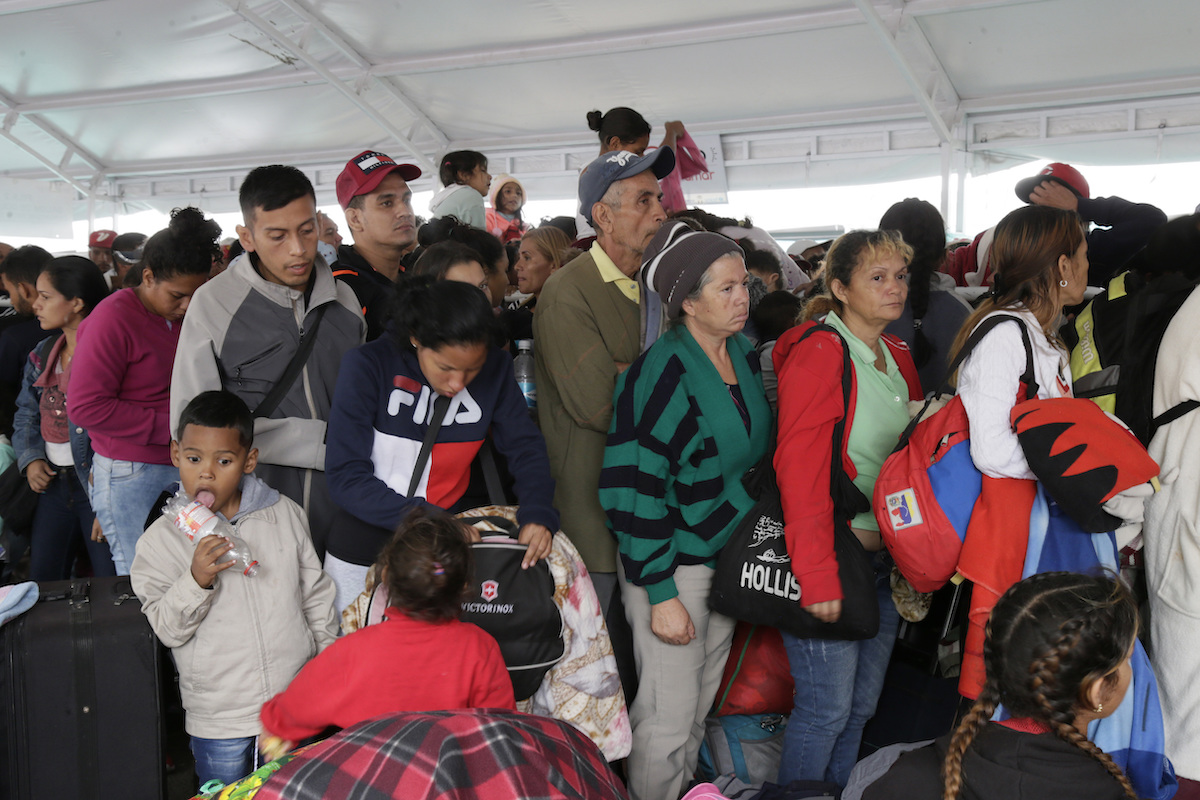

Venezuelans at an immigration processing office on the Rumichaca bridge before crossing the border from Colombia to Ecuador Thursday, June 13, 2019. Many of the Venezuelan migrants arriving here are making their way to Peru, where on June 15, the country will start requiring them to have a passport and humanitarian visa. Currently they can enter with their national Venezuela ID. (AP Photo/Dolores Ochoa)
By ARITZ PARRA and JOSHUA GOODMAN, Associated Press
BOGOTÁ, Colombia (AP) — Sweden is hosting talks between major powers with stakes in dealing with Venezuela’s political turmoil, the latest effort to jumpstart flagging attempts to find a peaceful solution to the country’s deepening crisis.
A European diplomat said Thursday that representatives of the United Nations, the Vatican, Cuba and the European Union were attending the talks. He also said that Washington and Moscow were joining the Stockholm meeting, though an American official with knowledge of the discussions said the U.S. was not participating.
“The talks in Stockholm are for backing the Norway dialogue,” the European diplomat said, referring to talks in Oslo between Venezuela’s government and opposition that have stalled in recent days. “All parties feel the need to keep as low key as possible because the mediation is going through a delicate phase.”
The Stockholm meeting comes as a growing chorus of international actors press for a mediated solution to end Venezuela’s power struggle. Opposition leader Juan Guaidó has channeled the frustrations of angry Venezuelans but has been unable to weaken President Nicolás Maduro’s grip on power. Meanwhile, punishing U.S. sanctions and pre-existing shortages of basic goods has made life more difficult for many Venezuelans.
Guaidó in brief comments during a tour of the northwestern state of Mérida told a crowd that Venezuela’s crisis was being discussed in Stockholm but offered no details. A Venezuelan government source with knowledge of the talks characterized them as a waste of time, saying only low-level diplomats were involved.
A spokeswoman for the Russian Foreign Ministry, Maria Zakharova, said Swedish officials were hosting an international meeting to seek solutions to the Venezuela ordeal. She said Russia was being represented by the head of the ministry’s South America department.
Enrique Iglesias, a seasoned diplomat recently appointed as the European Union’s special envoy for Venezuela, was also participating in the meeting, according to a representative who spoke on condition of anonymity because he wasn’t authorized to discuss the issue.
The latest development takes place just a week after Guaidó said no additional talks were immediately being planned in Norway. He reiterated that the opposition’s demand for a new presidential election is not negotiable. About 50 nations, including the United States, consider Venezuela’s 2018 presidential election illegitimate, in large part because strong opponents of Maduro were not able to run.
Maduro has stood by the validity of his re-election last year, showing no sign that he intends to go back to campaigning any time soon.
“Nobody who is straight in the head would sit across from a dictator thinking he is negotiating in good faith,” Guaidó said last Friday.
But the opposition’s options appear to be steadily dwindling. The initial enthusiasm among Venezuelans who poured into the streets by the thousands to support Guaidó has waned. An attempt to spark a military rebellion in late April quickly fizzled.
As the crisis drags on, droves of Venezuelans are continuing to flee and those who stay find their quality of life steadily deteriorating. The United Nations estimates 4 million have migrated in recent years to escape an imploding economy battered by hyperinflation and widespread shortages of food and medicine.
The government began circulating larger denominations of bolívar bills Thursday as it tries to keep up with inflation. The central bank said the bills of 10,000, 20,000 and 50,000 bolivares would help make payments and transactions “more efficient.” But the biggest new bill is worth just about $8.
Several Venezuelans were skeptical that the new measure would help.
Rafael Gerardi, a 57-year-old Caracas resident, said the new bills would just make it hard to get change after making a payment.
“It’s not logical,” he said.
***
Associated Press writers Kate de Pury in Moscow and Juan Pablo Arreaza in Caracas, Venezuela, contributed to this report.


